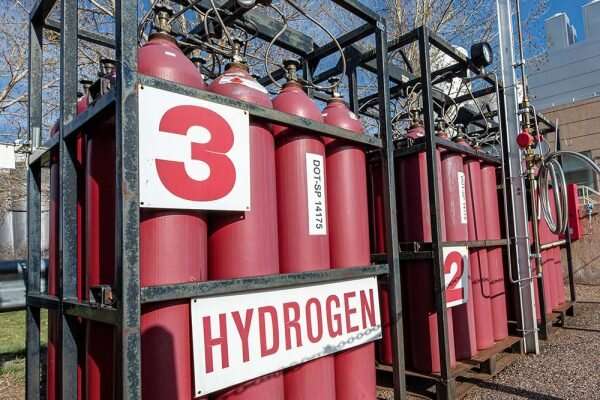Study offers plan to overcome hurdles for hydrogen energy

The U.S. is counting on hydrogen to play a significant role in the low-carbon economy of the future, but fundamental questions about transportation, storage and cost need to be addressed in order to integrate hydrogen gas into the nation's existing infrastructure, according to a preliminary study from a new research program at The University of Texas at Austin.
That's because although hydrogen gas burns carbon free, it only gives about a third of the energy of natural gas per unit volume. That means the U.S. will need to make and store much more of it for heating, transportation, power generation and industrial uses.
The research offers a framework for solving these issues, presenting an initial goal of replacing 10% of the nation's natural gas supply with hydrogen as a reasonable first target. That move could reduce U.S. greenhouse gasses by 3.2%, based on 2019 emissions, and help meet the Department of Energy's goal of enabling a low-carbon economy in the U.S.
The analysis considers what it would take to scale up the use of hydrogen, including integrating hydrogen into the country's natural gas system, which is probably the most robust in the world, said lead author Mark Shuster, associate director of energy at the Bureau of Economic Geology in the UT Jackson School of Geosciences.
"We know how to move gas. We're very experienced in it, particularly in the U.S., so it makes sense," he said. "You have a whole suite of potential uses for the hydrogen, but it's going to take some work, some research, and I think it's going to take probably some targeted incentives."
The paper, authored by scientists and economists at the bureau, was published in the Oil & Gas Journal. It came out as Secretary of Energy Jennifer M. Granholm announced the goal of reducing the cost of clean hydrogen from $5 a kilogram to $1 a kilogram in a decade.
Bureau Chief Economist Ning Lin, a study co-author, said that hydrogen projects will have to quickly become reality for the Department of Energy's goal to be met.
"There is a lot of research being done, but not enough demonstration," she said. "In order to achieve the goal of having hydrogen as a meaningful sector in our current energy system with competitive cost, we need to see material progress in scaling up to pilot test capacity and strong cost reduction evidence in the next five years."
Lin added that it takes at least five to six years to build necessary infrastructure to bring R&D projects to market.
Hydrogen has promise as a fuel because it is carbon free when burned and can be stored indefinitely. To have a real impact on the nation's greenhouse gas emissions, it probably would need to be used to generate electricity, said Shuster. The study points to pilot projects in Europe that have shown promising results using a mixture of 10% hydrogen in the gas supply for both power production and heating.
But there are many complicating factors. Hydrogen carries only about a third of the energy of natural gas, and so requires more storage space. Furthermore, 98% of hydrogen is currently produced from natural gas and 1% made through electrolysis, a process that splits water into hydrogen and oxygen using electricity. This means that hydrogen could be produced from solar, wind or other low-carbon sources, but currently the technology is expensive and not available at scale.
The preliminary work and the proposed research program offer potential solutions to these roadblocks. Hydrogen can lean heavily on geologic storage instead of tanks or batteries, researchers said, with the gas stored in suitable underground formations and moved via pipeline. There are currently three such geologic storage locations in the country being used for hydrogen and many more for natural gas. The UT team pinpointed other potential storage areas across the country.
To help bridge the gap until electrolysis technology can catch up, the study recommends ramping up hydrogen production using natural gas with carbon capture technology, which keeps carbon out of the atmosphere by piping it underground into geologic formations.
"We can utilize natural gas right now, if you're prepared to move forward with carbon capture and storage, and give the electrolysis and related technologies a chance to catch up and become more economically viable," Shuster said.
More information: www.ogj.com/pipelines-transpor … -realistic-framework
















